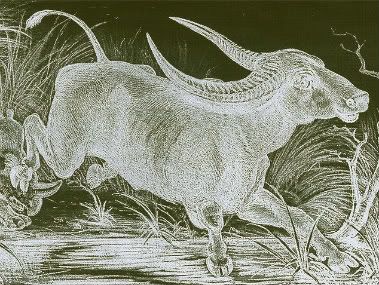Buffalo Dream
& remembering my maternal uncle
by Haris Adhikari

People say it is ominous
if you see a buffalo chasing you in dream.
I had seen one
three days before my maternal uncle passed away.
It was with jutted hooked horns and angry eyes
prowling towards me.
I nervously leaped down from my path
onto a terrace of maize with dried leaves
and full grown long grass, and ripened pumpkins beneath.
Leaning against the slope and breathing as little as possible,
I waited for the devil to be off
but it was not to be so –
he too waited quietly, making sure where I was
and jumped down
but only to let me flinchingly ascend
to the path above.
It was about three - cold, dreadful night
when I heard my uncle coughing and wheezing in the next room,
his painful mutters, punctuated by gasps,
wafted like the bizarre thud that
comes from hollow tree trunks in windy days.
Maiju (aunty) woke up and positioned his upper half raised
against the soft blankets and pillows, and sat by his side
comforting him, ‘If only I could share the pain…’'
He looked lost in the dim, flickering lamp light.
After three days we heard
‘Fine, it was immense pain he was living…’'
I feel like
it was just yesterday when
he was having me cut his crooked nails
and meanwhile
I was enjoying a lively chat with him
in his small garden.
Afterwards he was telling me the gripping saga of his life:
how he got to Assam, Manipur, Bangla, Punjab - and then
a listless zigzag wanderings, and finally after years
back to Nepal.
He was a storehouse of a great many folk stories.
His recitals of Deusi at Tihar would arouse the love
for our genuine roots - even in the teens.
I regret I could not learn much from him.
But I’m glad that
I happened to spend some memorable days with him
before the buffalo dream.
Haris Adhikari is from Jhapa, Nepal, currently staying in Kathmandu. He has an MA in English and American literature from Tribhuvan University. A member of The Society of Nepali Writers in English, he is a teacher of English by profession. His Nepali poems and songs have appeared in Gorkhapatra, Bimarsha and Kantipur Kopila. His English poems are coming up in Mad Swirl and Locust Magazine (Volume 3, Issue 1) in the US. At present, he is working on his first English poetic collection which he hopes will be out by November. He primarily loves to write conversational and contemplative poetry, digging into the layers of phony faces, violence, injustice, shattered dreams, disillusionment, etc. And he describes himself as “a branch extended to aloofness that heavily swings when the day is windy”.
Haris has translated a number of articles from English and Hindi into Nepali. In 2008, he co-translated ‘Releasing the Powers of Junior Youth’, a wonderful book on life and philosophy, for the Baha’i Community of Nepal. He worked for Nepal Monitor, a semi–scholarly online journal, for half a decade until 2008 as a research assistant and contributor.
He blogs at: http://harisadhikari.blogspot.com/
What inspires you to write and keep writing?
I basically feel strong urge to write when I’m deeply moved by sensitive issues like complications in relationships, philosophical and ethical questions in day to day life, and social, cultural and political problems in the modern world.
I have an allergy to phony faces. I can’t help but raise a finger at them. I have seen more than often disparity between people’s principles and conduct. Man is essentially very fragile. And I have found politics of any kind (that we have in families, between classes, races, cultures and nations) very cruel and life damaging. Politics works as people’s fate. So, I find frustration, conflict and rebellion in man’s heart.
Ideas come as I keep on mulling over the issues that touch my sensibility. Interaction, observation and contemplation help me to go to the depth of the subject matters in hand. I do not sit to write when I do not feel like writing. And when I’m short of time, I just jot down my first impressions and revisit them later.





0 comments:
Post a Comment